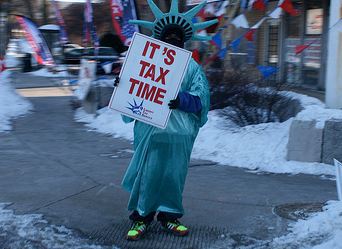12 Scams To Watch Out For During Tax Time
For the last several years, the IRS has released their Dirty Dozen list of tax scams, including schemes involving return preparer fraud, hiding income offshore and phishing. They recently posted the 2010 version on their website.
1. Return Preparer Fraud:
Dishonest return preparers derive financial gain by, for example, skimming a portion of their clients’ refunds, charging inflated fees for return preparation services and attracting new clients by promising refunds that are too good to be true. Be extra careful when selecting a preparer — You will be liable for any unpaid taxes and penalties due as a result of preparer fraud.
2. Hiding Income Offshore:
Taxpayers have tried to avoid or evade U.S. income tax by hiding income in offshore banks, brokerage accounts or through the use of nominee entities. Taxpayers also evade taxes by using offshore debit cards, credit cards, wire transfers, foreign trusts, employee-leasing schemes, private annuities or insurance plans.
The IRS urges those with offshore accounts to voluntarily come forward, as it “may mitigate their risk of criminal prosecution.”
3. Phishing:
IRS impersonation schemes flourish during the filing season and can take the form of e-mails, tweets or phony Web sites. Scam artists will try to mislead consumers by telling them they are entitled to a tax refund from the IRS and that they must reveal personal information to claim it.
If you receive suspicious e-mails claiming to come from the IRS, do not open any attachments or click on any of the links in the e-mail. Suspicious e-mails claiming to be from the IRS or Web addresses that do not begin with http://www.irs.gov should be forwarded to the IRS mailbox: phishing@irs.gov.
4. Filing False or Misleading Forms:
Some folks file false or misleading returns to claim refunds that they are not entitled to. They will fabricate an information return and falsely claim the corresponding amount as withholding as a way to seek a tax refund. Phony information returns, such as a Form 1099 Original Issue Discount (OID), claiming false withholding credits usually are used to legitimize erroneous refund claims.
5. Nontaxable Social Security Benefits with Exaggerated Withholding Credit:
This is where taxpayers report nontaxable Social Security Benefits with excessive withholding. This tactic results in no income reported to the IRS on the tax return. Filings of this type of return may result in a $5,000 penalty.
6. Abuse of Charitable Organizations and Deductions:
This involves people using charities to improperly shield income or assets from taxation and attempts by donors to maintain control over donated assets or income from donated property. There are also various schemes involving the donation of non-cash assets, including situations where several organizations claim the full value for both the receipt and distribution of the same non-cash contribution. Often these donations are highly overvalued or the organization receiving the donation promises that the donor can repurchase the items later at a price set by the donor.
7. Frivolous Arguments:
Promoters of frivolous schemes encourage people to make unreasonable and outlandish claims to avoid paying the taxes they owe. If a scheme seems too good to be true, it probably is.
8. Abusive Retirement Plans:
The IRS is looking for transactions that taxpayers use to avoid the limits on contributions to IRAs, as well as transactions that are not properly reported as early distributions. Taxpayers should be wary of advisers who encourage them to shift appreciated assets at less than fair market value into IRAs or companies owned by their IRAs to circumvent annual contribution limits.
9. Disguised Corporate Ownership:
Corporations and other entities are formed and operated for the purpose of disguising the ownership of the business or financial activity and facilitate underreporting of income, fictitious deductions, non-filing of tax returns, participating in listed transactions, money laundering, financial crimes and even terrorist financing.
10. Zero Wages:
Filing a phony wage- or income-related return to replace a legitimate one has been used as an illegal method to lower the amount of taxes owed. Typically, a Form 4852 (Substitute Form W-2) or a “corrected” Form 1099 is used as a way to improperly reduce taxable income to zero. Filings of this type of return may result in a $5,000 penalty.
11. Misuse of Trusts:
While there are many legitimate, valid uses of trusts in tax and estate planning, some promoted transactions promise reduction of income subject to tax, deductions for personal expenses and reduced estate or gift taxes. Such trusts rarely deliver the tax benefits promised and are used primarily as a means to avoid income tax liability and to hide assets from creditors, including the IRS.
12. Fuel Tax Credit Scams:
Individuals are claiming the tax credit for nontaxable uses of fuel when their occupation or income level makes the claim unreasonable. Fraud involving the fuel tax credit is considered a frivolous tax claim and potentially subjects those who improperly claim the credit to a $5,000 penalty.
Beware of IRS’ 2010 “Dirty Dozen” Tax Scams [IRS]
Want more consumer news? Visit our parent organization, Consumer Reports, for the latest on scams, recalls, and other consumer issues.


